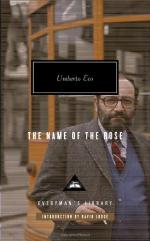|
This section contains 287 words (approx. 1 page at 400 words per page) |

|
Like the entirety of the novel, the social concerns expressed in The Name of The Rose function on at least two levels: they are applicable to medieval times as well as to contemporary society. As Eco writes in his Postscript to "The Name of the Rose": "The Middle Ages are our infancy, to which we must always return, for anamnesis." In addition to the attention paid to various heresies and sects, Eco deals extensively with conflicting ideas on clerical poverty. The Emperor Louis IV asserts the need for the vow of poverty among the clergy, while the corrupt Pope John XXII argues that poverty would diminish the prestige and power of the Church. Other groups, such as the Fraticelli, argue for complete poverty through the abandonment of all material possessions. These conflicts anticipate the battles between religious, social, and political ideologies today.
Especially important are the...
|
This section contains 287 words (approx. 1 page at 400 words per page) |

|




